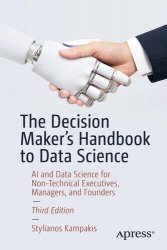The Decision Maker's Handbook to Data Science: AI and Data Science for Non-Technical Executives, Managers, 3rd Edition
- Добавил: literator
- Дата: 2-07-2024, 03:54
- Комментариев: 0
 Название: The Decision Maker's Handbook to Data Science: AI and Data Science for Non-Technical Executives, Managers, and Founders, 3rd Edition
Название: The Decision Maker's Handbook to Data Science: AI and Data Science for Non-Technical Executives, Managers, and Founders, 3rd EditionАвтор: Stylianos Kampakis
Издательство: Apress
Год: 2024
Страниц: 189
Язык: английский
Формат: pdf (true), epub (true), mobi
Размер: 10.1 MB
Data Science is expanding across industries at a rapid pace, and the companies first to adopt best practices will gain a significant advantage. To reap the benefits, decision makers need to have a confident understanding of data science and its application in their organization. This third edition delves into the latest advancements in AI, particularly focusing on large language models (LLMs), with clear distinctions made between AI and traditional data science, including AI's ability to emulate human decision-making.
Author Stylianos Kampakis introduces you to the critical aspect of ethics in AI, an area of growing importance and scrutiny. The narrative examines the ethical considerations intrinsic to the development and deployment of AI technologies, including bias, fairness, transparency, and accountability. You’ll be provided with the expertise and tools required to develop a solid data strategy that is continuously effective. Ethics and legal issues surrounding data collection and algorithmic bias are some common pitfalls that Kampakis helps you avoid, while guiding you on the path to build a thriving data science culture at your organization. This updated edition also includes plenty of case studies, tools for project assessment, and expanded content for hiring and managing data scientists.
Data Science is a language that everyone at a modern company should understand across departments. Friction in communication arises most often when management does not connect with what a data scientist is doing or how impactful data collection and storage can be for their organization. The Decision Maker’s Handbook to Data Science bridges this gap and readies you for both the present and future of your workplace in this engaging, comprehensive guide.
Artificial Intelligence (AI) is an umbrella term that captures an extraordinary field of computer science dedicated to creating systems capable of tasks that, until recently, required human intelligence. Today, AI stands at the forefront of innovation. The development of advanced algorithms and the exponential increase in computational power have catapulted AI from academic papers to real-world applications. Machine Learning (ML), a cornerstone of contemporary AI, is predicated on the principle that systems can learn from data, identify patterns, and make decisions with minimal human intervention. This paradigm shift from explicit programming to data-driven learning has been pivotal to AI’s success. By using algorithms that iteratively learn from data, ML has enabled AI to develop predictive models that are integral to a myriad of applications, from email filtering to sophisticated diagnostics in healthcare. Deep Learning, a subset of ML, has taken inspiration from the information processing patterns found in the human brain. It utilizes algorithms called neural networks which consist of layered structures resembling neurons. These networks can learn and make intelligent decisions on their own. Deep Learning has been fundamental in advancing AI, enabling machines to recognize images, decipher spoken words, and even generate human-like text. The depth of these networks, often composed of many layers, allows for the processing of data with unprecedented complexity and abstraction, powering advances in fields like computer vision and speech recognition.
What You Will Learn:
Integrate AI with other innovative technologies
Explore anticipated ethical, regulatory, and technical landscapes that will shape the future of AI and Data Science
Discover how to hire and manage data scientists
Build the right environment in order to make your organization data-driven
Who This Book Is For:
Startup founders, product managers, higher level managers, and any other non-technical decision makers who are thinking to implement Data Science in their organization and hire data scientists. A secondary audience includes people looking for a soft introduction into the subject of Data Science.
Contents:
Скачать The Decision Maker's Handbook to Data Science: AI and Data Science for Non-Technical Executives, Managers, and Founders, 3rd Edition
Внимание
Уважаемый посетитель, Вы зашли на сайт как незарегистрированный пользователь.
Мы рекомендуем Вам зарегистрироваться либо войти на сайт под своим именем.
Уважаемый посетитель, Вы зашли на сайт как незарегистрированный пользователь.
Мы рекомендуем Вам зарегистрироваться либо войти на сайт под своим именем.
Информация
Посетители, находящиеся в группе Гости, не могут оставлять комментарии к данной публикации.
Посетители, находящиеся в группе Гости, не могут оставлять комментарии к данной публикации.

